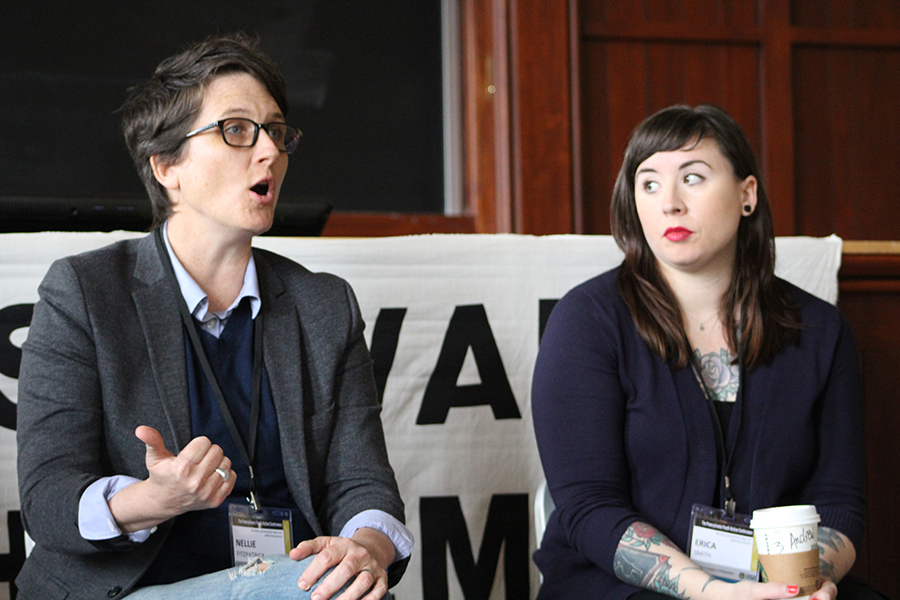The fifth-annual Pennsylvania Youth Action Conference was held April 8-10 at the University of Pennsylvania, bringing together more than 100 youth activists throughout Pennsylvania to discuss LGBT safety in the state.
“We’re working toward creating the change we want to see in the world and that starts here at the Pennsylvania Youth Action Conference,” said Jason Landau Goodman, founder and executive director of the Pennsylvania Youth Congress, which is Pennsylvania’s first and only statewide LGBTQ youth-advocacy organization and hosting organization to the YAC.
The conference, which emphasized issues in transgender safety, was designed to create a social-justice movement and build the activism that is essential to LGBT community safety in Pennsylvania. Those in attendance experienced three days of plenary talks and panels by leaders in the LGBT community, as well as breakout sessions, encouraging meaningful dialogue and exploring issues facing the community.
The opening plenary focused on the history of violence against the trans community and actions that can be taken to work toward a safer environment.
“We’re tired of eating crumbs from a table we should be sitting at,” said Samantha Jo Dato, director of the Philly Trans Health Conference, which is the largest conference of its kind in the world. As a trans woman of color, Dato discussed her efforts to strengthen the bridge of kinship in her community nationally.
Dato noted the average life expectancy for a trans woman of color has dropped to the staggeringly low age of 29. Besides physical brutality, the lack of opportunity has led to a rise in homelessness and hunger among trans women of color.
“We’ve only learned survival skills because we’ve been forced to. Now we need the opportunity to stop learning survival skills and start learning life skills,” said Deja Lynn Alvarez, trans activist and director of Divine Light LGBTQ Wellness Center, Philadelphia’s first LGBT homeless shelter. “Let’s start at the beginning and give everyone an equal opportunity.”
Alvarez has expanded her activism efforts to work with the Philadelphia Police Department, where she interfaces directly with law-enforcement officials to address the long history of issues between police and the trans community.
While the consensus was that there has been much growth for the trans community, there was overwhelming agreement that there is a long road ahead.
“When strides are made, there’s often backlash,” said Timothy Cwiek, longtime PGN reporter who worked on bringing transparency to the 2002 death of trans woman Nizah Morris.
Talks continued Saturday, where the afternoon’s plenary focused on criminal-justice reform. The panel, consisting of activists and trans women who had experienced injustices during incarceration, addressed how to amend the current system while channeling energy into long-term reform.
“Are the systems broken? Quite frankly, the systems haven’t been built yet,” said Nellie Fitzpatrick, director of the Philadelphia Office of LGBT Affairs. She added the system was not created for people who don’t fall exactly within the gender binary, which leaves many trans people marginalized. While the panel accentuated a need for overall reform, Fitzpatrick is pushing for short-term changes.
“I’ll be damned if I sit around and sacrifice progress for absolute perfection,” Fitzpatrick said.
Some of that progress lies in Directive 152, which the Philadelphia Police Department put in place two years ago to address how officers interact with the trans community, including details on respecting pronouns and gender identity. That, paired with the Prison Rape Elimination Act, have helped the incarcerated trans community attain better treatment while in prison.
However, it is up to local leaders to implement PREA. The panel pointed to young activists as potential vanguards for taking on their local prison systems.
While laws may be on the books, making sure they’re carried out is another battle.
A representative from Hearts on a Wire, a Philadelphia-based organization focused on ending policing and imprisonment of LGBT communities, read letters written by trans inmates, citing mental and physical torture and being “treated like animals.”
“We become sexual objects in prison when they house us in the wrong place,” said Ciora Thomas, founder of Pittsburgh-based sisTers United, a community organization for trans women of color suffering discrimination. Thomas told the crowd her story of homelessness, sex work and abuse from fellow inmates and guards during incarceration in a male prison.
“I know change takes time,” Thomas said, “but we don’t have time. I’m losing my sisters and brothers every day.”
Stonewall Riots veteran Miss Major Griffin-Gracy shared her own experiences with incarceration and activism in her keynote speech Saturday evening.
Though the community still experiences tragedies provoked by ignorance and bias, YAC attendees were optimistic that efforts such as those highlighted at the conference will open the door to a safer future.
“We’re getting things done at the local and state level that even we never imagined possible,” Goodman said. “You have the power across the state to make a huge change.”

